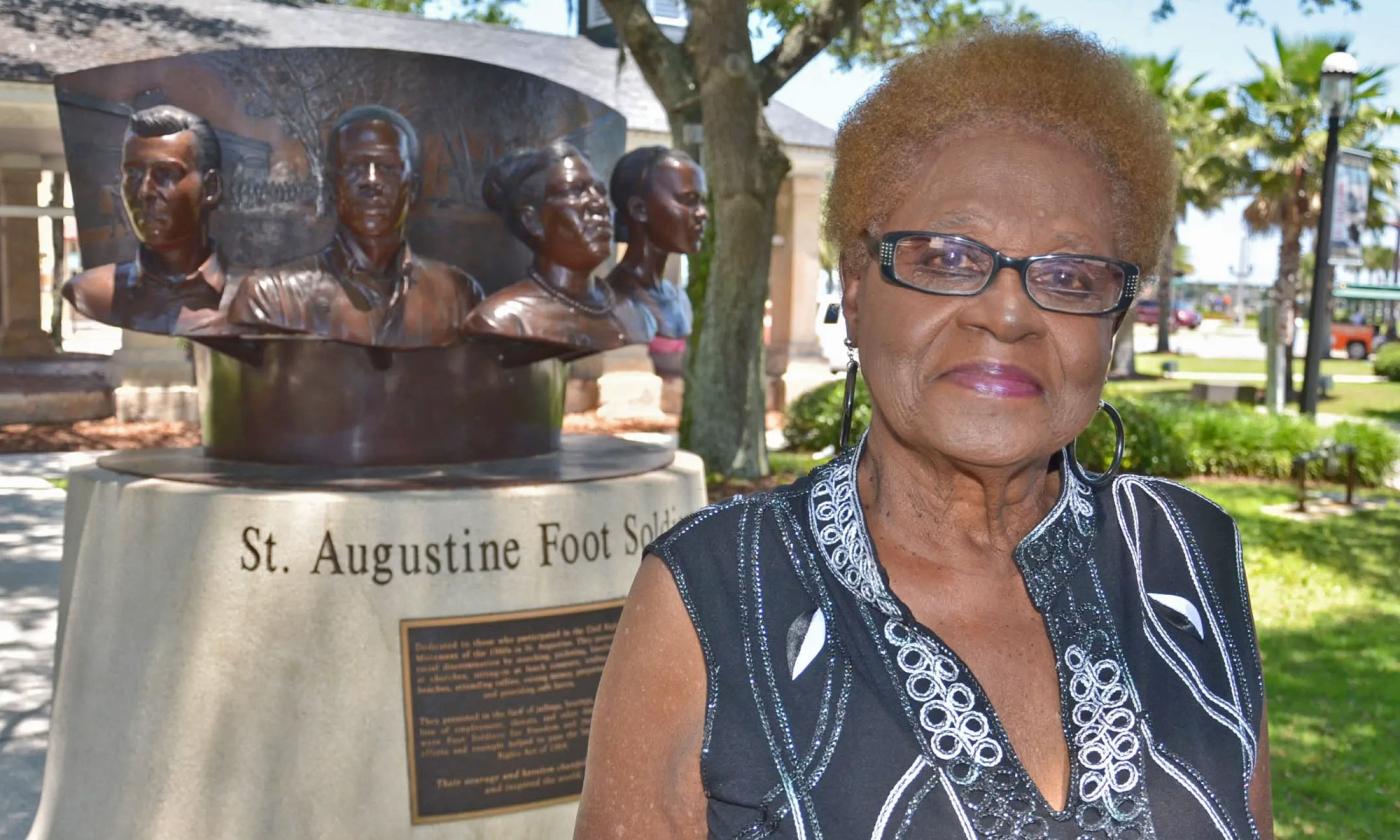
Barbara Henry Vickers
Local WWII patriot and Civil Rights activist.
Barbara Henry Vickers
Childhood in St. Augustine
Growing up in the Lincolnville neighborhood, she was raised in a strict but loving Catholic household. In her family's historic house at 95 Park Place, young Barbara was surrounded by multiple generations of relatives and friends.
Barbara attended St. Benedict the Moor Catholic School until she finished eighth grade in 1939 — there, she learned a discipline and faith that would serve her far into adulthood. Barbara went to Lincolnville’s Excelsior High School and was a member of the Excelsior Bulldogs basketball team. Under coach Solomon Calhoun, the Bulldogs became state champions.
World War II Service
After graduating from Excelsior in 1942, Barbara moved to New York City, eager to do her part in the ongoing conflict we now know as World War II (WWII). Driven by a sense of duty, she became a tack welder, embodying the iconic spirit of "Rosie the Riveter." This journey led her to the Boeing company in Seattle, Washington, where she worked as a mechanic.
Returning to New York, Vickers enrolled in beauty school. After the end of WWII, she found love with Eddie Vickers, a WWII veteran and fellow St. Augustine local.
Back Home to St. Augustine
Newly married, the Vickerses moved back to Florida in the late 1950s. Barbara established herself as an independent business owner, running her salon "Barbara's Hair Fashion" on Central Avenue (now Martin Luther King Jr. Avenue). Eddie became a recreation leader under the tutelage of Barbara's old basketball coach, Solomon Calhoun.
Soon after their return, the couple bought a new home in the growing West King Neighborhood on Scott Street (now Dr. R. B. Hayling Place). Merely because they were African Americans living in new housing, Scott Street residents faced racism and violence from groups like the Ku Klux Klan (KKK) and Manucy's Raiders (a local Catholic contingent of white supremacists).
Dr. Hayling Comes to Town
In 1960, Barbara's activism ignited when she met Robert B. Hayling, a civil rights advocate and new Scott Street resident. Inspired by Hayling's commitment, she began participating in peaceful, nonviolent resistance — she attended talks at local churches (St. Paul AME Church being a central hub of civil rights activity), chose not to support segregated businesses, and eventually picketed alongside Dr. Martin Luther King Jr.
As the St. Augustine Civil Rights Movement grew in intensity (and Dr. Hayling became a target of racist groups), Barbara and her neighbors founded the Scott Street Eleven. Together, they monitored KKK activity and notified each other of impending danger. Julia Conway, another neighbor, formed an emergency telephone "tree" so that information would travel quickly.
Barbara's Legacy as a Humanitarian
After the Civil Rights Movement, Barbara continued her service by raising funds for activists and collaborating with Tanzie Hazel in the Ancient City Charity Club. Reflecting on the violence of the American Civil Rights Movement, she initiated the St. Augustine Foot Soldiers Remembrance project, unveiling a monument in 2011 in the Plaza de la Constitución. This monument symbolizes unity in the face of adversity.
Barbara Vickers' legacy as a humanitarian and activist endures, serving as a perpetual source of community inspiration.
Resources
Online Resources
- Click here to watch an oral history interview of Mrs. Barbara Henry Vickers, courtesy of the Library of Congress.
- Click here to watch an oral history interview of Mrs. Barbara Vickers, courtesy of the St. Augustine Civil Rights Library & Flagler College.
- Click here to read the Florida Today article “Florida Frontiers: Early foot soldiers for civil rights,” by Ben Brotemarkle.
- Click here to read the St. Augustine Record article “Barbara Vickers: Making the civil rights memorial,” by Margo C. Pope.
Further Reading
From Rosie the Riveter to Hometown Activist: The Story of Barbara Vickers, by Barbara Vickers, 2022.

